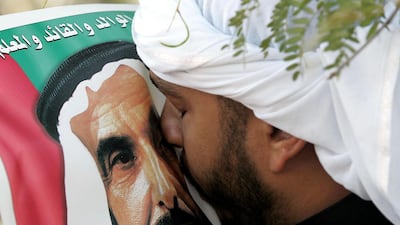On the anniversary of his death in the middle of Ramadan, Sheikh Zayed's legacy is as tangible as ever. Today, on the 19th day of the holy month, it is a time to reflect on and commemorate his extraordinary impact and the values he imbued in the foundation of the UAE, among them the importance of giving and supporting the community. Those founding principles are embodied in Zayed Day for Humanitarian Action, named after him and carrying special resonance as it falls in the Year of Zayed, the centennial anniversary of his birth. Today is a time for a nation built on tolerance to reaffirm its commitment to the values the Founding Father spent his life espousing. When he inaugurated Zayed Day for Humanitarian Action six years ago, Sheikh Mohammed bin Rashid, Vice President, Prime Minister and Ruler of Dubai, said it was a celebration of "Sheikh Zayed's spirit of philanthropy" and "the Emirati culture of giving".
For half a decade, the UAE has been the world's largest aid donor relative to national income. That altruism is especially visible during Ramadan, whether it is through individual acts of kindness, such as donors feeding hundreds of workers through the Ramadan Sharing Fridges initiative, or in the gestures of UAE billionaires who sign away half their wealth to good causes. Sheikh Zayed's legacy lives on in each of these good deeds, both large and small. He treasured equality, treating everyone as a "special soul" and welcoming residents and visitors from across the globe.These timeless principles are woven into the fabric of the UAE today.
Born into hardship in the punishing desert heat, Sheikh Zayed’s early years were characterised by scarcity – yet he went on to build a nation. In 1971 the UAE was born and with it the miraculous story of almost 47 years. Despite its astonishing economic and demographic growth, the country’s leaders have never lost sight of the values that brought it into existence. In a region sundered by violence and conflict, that enduring message of solidarity is a rare one. Above all, Sheikh Zayed bred loyalty so it is little surprise that when he died, there was a national outpouring of grief and emotion. As the nation continues to mourn his death, we can also take comfort from the fortitude of his message, even more relevant now than when it was little more than an aspiration.

